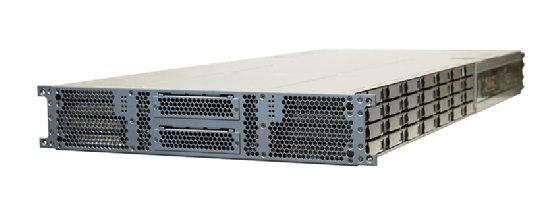
luchschen_shutter - Fotolia
Newisys NVMe flash array chases hyperscale market
Sanmina-owned Newisys is known as a white-label server OEM to array vendors. The NSS-2560 NVMe flash provides storage density with hot-pluggable SSDs and Intel Broadwell servers.
Newisys today formally expanded beyond its server roots with the launch of a dense NVMe all-flash storage system: the NSS-2560, which packs nearly 1.7 petabytes of raw capacity in 2U.
The latest Newisys NVMe flash storage was introduced during a demonstration at Flash Memory Summit 2018 in Santa Clara, Calif. At that trade show last year, Newisys won a best-of-show award for its introductory NDS-22482F NVMe over Fabrics Ethernet JBOF (just a bunch of flash) product.
The NSS-2560 server is designed with a drop-down side panel to load 56 NVMe U.2 SSDs. The enclosure contains two Newisys storage server modules, each equipped with dual Intel Broadwell CPUs. Intel Skylake-based server modules are on the Newisys NVMe flash storage roadmap.
The Newisys servers run in parallel and both can access all the NVMe SSDs in the system. Customers can swap out failed drives or servers nondisruptively.
Newisys does not package an operating system on the NSS-2560 hardware. The system supports Microsoft Windows, Red Hat Enterprise Linux and open source Linux variants CentOS, Fedora and Ubuntu.
Newisys is an independent engineering subsidiary of Sanmina Corp., an electronics manufacturing contractor. Sanmina acquired Newisys in 2003. Newisys is best known for its OEM server partnerships with storage vendors.
The Newisys NVMe storage brand was launched several years ago, but the vendor is now looking to ramp up marketing and customer awareness. Other NVMe storage in the Newisys lineup includes the 2U NDS-2244 PCIe over Fabric JBOF, the 2U NSS-2247G quad server, and 1U NSS-1160G database-acceleration server.
"We have been selling in volume to the largest hyperscale data centers for years, but we're not well-known [for storage]. We had a restructuring and management change and we're now coming out of stealth mode," said Dan Liddle, a Newisys vice president of marketing for servers and storage.
The price of an NSS-2560 array will vary depending on the type of NVMe SSD needed, Liddle estimated, with the price between $50,000 and $200,000 per unit according to the type of NVMe SSD configuration a customer chooses. Newisys plans to sell directly to enterprises and cloud service providers, and Liddle hinted that plans are under way to firm up its channel strategy.
Liddle said Newisys' history of selling storage servers "gives us an advantage in going to NVMe because we're not starting from scratch. We've got a base of understanding that makes [for] a cleaner transition to an NVMe platform."

Newisys NVMe flash elbows into crowded market
Industry analysts say the emerging NVMe standard for flash and memory-based storage technologies drastically reduces latency by streamlining the transport of SCSI commands. NVMe enables storage to access a computer processor directly across a PCI Express link. Legacy SAS and SATA SSDs incur latency due to host bus connectors that send commands across a network in multiple hops.
Analyst firm IDC projects NVMe-based flash storage will account for more than half of all sales of external primary storage by 2021. Gartner pegs NVMe adoption at 30% by 2021, compared with 1% presently.
The NSS-2560 is designed with a Newisys SAS server chassis reconfigured for the NVMe protocol, said Rick Kumar, Newisys senior vice president of servers and storage marketing. Four 16-lane PCIe add-in cards and up to eight dual inline memory modules per CPU are standard. The 64 PCIe lanes are evenly divided: 32 lanes to the NVMe SSDs and 32 lanes to networks, with connectivity across four 100 Gigabit Ethernet ports.
Newisys claims the NSS-2560 is rated to provide 50 Gbps read performance, 12.5 million read IOPS and 64 Gbps of bandwidth between servers and SSDs.
"Our system is built to be balanced across the entire platform. We make sure there is sufficient connectivity between the drives and the network connections. People are [buying] high-end NVMe drives for performance and latency, and we want to make sure the unit can handle their workloads," Liddle said.
Tom Coughlin, president of data storage consulting firm Coughlin Associates in Atascadero, Calif., said the Newisys NVMe flash capacity holds appeal for service providers and specialized data center applications, including online transaction processing.
"This is a pretty dense 2U package with almost 2 petabytes (PBs) of raw native capacity. This platform gives you a lot of availability. It's a pretty impressive box," Coughlin said.
A compelling selling point, Coughlin added, is relatively low performance penalty for internal-to-external network traffic. "It's only about 14 Gbps [of consumed throughput] out of the 64 Gbps" to connect the drives to servers, he said.
'Our NVMe flash array won't compete with storage vendors'
Newisys plans to continue selling storage servers to OEMs, which raises the possibility its NVMe-based storage could wind up competing with some of its own customers. That's a conundrum that larger server vendors have also faced.
Before merging with Dell Technologies in 2015, EMC partnered with Cisco to bundle its storage and VMware virtualization on Cisco UCS servers and networking. The relationship worked well -- at least until VMware broadened into network virtualization, posing a threat to Cisco's server business and straining the EMC-Cisco partnership. Legacy EMC storage now uses Dell PowerEdge servers.
Kumar said the vendor expects to continue to partner with, not compete, with its OEMs.
"We've been very sensitive to that. We've talked to our partners and they're comfortable with it, as long as we don't disclose anything under NDA (nondisclosure agreements). We're confident we won't be perceived as a competitor," Kumar said.






